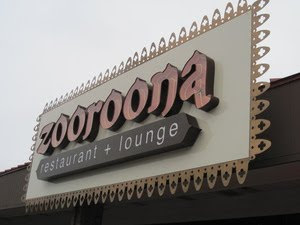 I went to Alhambra Palace Restaurant in Chicago a couple years back with some girlfriends, a place that serves authentic and healthy Moroccan Mediterranean cuisine. Named after an actual palace in Granada, Spain, it claims to be one of the largest restaurants in the world. It boasts over 24,000 square feet that includes five private and semi private rooms. According to the website, it’s an ode to Persian, Mediterranean, and Middle Eastern culture and décor. It was cool, to say the least.
I went to Alhambra Palace Restaurant in Chicago a couple years back with some girlfriends, a place that serves authentic and healthy Moroccan Mediterranean cuisine. Named after an actual palace in Granada, Spain, it claims to be one of the largest restaurants in the world. It boasts over 24,000 square feet that includes five private and semi private rooms. According to the website, it’s an ode to Persian, Mediterranean, and Middle Eastern culture and décor. It was cool, to say the least. My girlfriends and I ended up ordering food items that looked familiar. Even though the menu was intimidating, I still felt like I had cheated myself by the end of the night.
I remember thinking that the quality of the food didn’t matter because the interior décor made up for any bad food or service. I really did feel transported to another part of the world, which is the owner’s hope (again, according to the website). He’s imported everything from chandeliers to tiles from the Mediterranean and the Middle East. Whatever it cost, it was worth it.
Authenticity isn’t so easy to define or to distinguish, like we talked about in class the other day. Looking back on my experience at Alhambra Palace, it was my first experience with Moroccan Mediterranean cuisine and I was so awestruck by the aesthetics that I wouldn’t have known (or cared) if the decorations or the food weren’t authentic. I would’ve believed anything anybody told me about the establishment.
My fear for this assignment is not recognizing authenticity when it’s sitting in front of me, or believing that something/some food is authentic when it’s really not. Like I mentioned in class the other day, I don’t want to be fooled into thinking a restaurant is authentic because I don’t understand what's listed on the menu.
And not to be cynical, but should I just believe my waiter when I ask him or her questions about the origin of the food? Are waiters trained to tell us what we want to hear...at least about things that seem as harmless as where the decorations are imported from? A restaurant is just like any other business that wants to keep the customers happy. I supposed that’s a whole different discussion on restaurant ethics.
I’ve decided to review Zooroona—Middle Eastern cuisine. As cliché as it may sound, I want to be transported to a different place, both through food and décor. I want a comfortable atmosphere, and good service, too.
Aside from becoming disenchanted by the lack of authenticity or my willingness to believe my own assumptions without question, my biggest concern is that, as a picky eater, I’ll revert to the familiar dishes like I did at Alhambra Palace. I tend to get overwhelmed by large menus in general, and even more so when it’s written in a language I’m not familiar with.
Furthermore, after our conversation about authenticity the other day, I don’t want Zooroona to be like the Thai restaurants from Molz’s article in Culinary Tourism that cater to the average American consumer; I don’t need to “understand” everything. I just want to experience it and not be the ignorant first-time-Middle-Eastern-cuisine-eater who orders crispy chicken wings (Yes, it’s on the menu.) I’m willing to get lost in the language and not know exactly what I’m eating until it reaches the table, as long as it’s authentic.
No comments:
Post a Comment